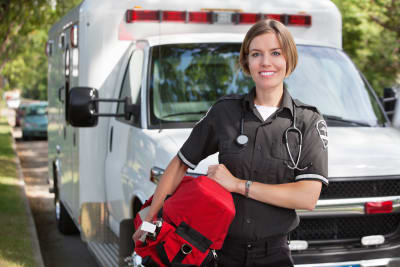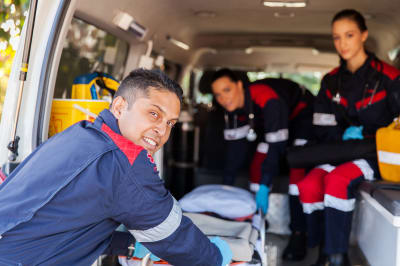Medical laboratory technicians are allied healthcare professionals specializing in running laboratory tests and procedures to aid physicians and surgeons in diagnosing and treating diseases.
MLTs are invaluable to most hospitals, physicians’ offices, and outpatient care facilities. For this reason, the field continues to enjoy high demand and positive projections.
To become a medical laboratory technician, you must acquire the right training from the right institutions. Thankfully, there is plenty of worthy alternatives all over the nation. Below we look at some of the most important things you need to know before enrolling in a medical laboratory technician program.
We also provide a list of some of the best options to consider.
Path to Becoming a Medical Laboratory Technician
Becoming a medical laboratory technician usually involves four key steps, two of which are optional depending on the state where you wish to reside. The first mandatory step is to possess a high school diploma or GED, while the second is to obtain training from an associate’s degree or certificate program.
The next two steps of getting certified and getting licensed are generally optional, although getting certified is always advisable, thanks to the edge it gives you when seeking employment.
Of all the steps involved, it is safe to say that enrolling in an educational program is the most important.
What to Know Before Enrolling in a Program
Before you enroll in a program, it is always important to decide whether or not you’re willing to spend two years pursuing an associate’s degree or go for a certificate program that takes only a year or less.
Either way, you must attend institutions and enroll in accredited programs. And yes, accreditation is important on both institutional and programmatic levels.
With accreditation, it becomes easier to get certified and secure employment. Most importantly, it becomes almost impossible to judge beforehand the quality of the education you will be receiving.
The National Accrediting Agency for Clinical Laboratory Sciences (NAACLS) is the predominant accreditation body for medical laboratory technician programs on the programmatic level.
On the institutional level, schools may choose to get accredited by any one of the six regional organizations recognized by the Department of Education. These include:
ACCJC - Accrediting Commission for Community and Junior Colleges
HLC - Higher Learning Commission
MSCHE - Middle States Commission on Higher Education
NECHE - New England Commission of Higher Education
NWCCU - Northwest Commission on Colleges and Universities
SACSCOC - Southern Association of Colleges and Schools Commission on Colleges
WSCUC - WASC Senior College and University Commission
Medical Laboratory Technician Schools
Below is a detailed list of the best schools offering accredited medical lab technician programs. The entries have been grouped into offline, online, and hybrid categories.
On-Campus Medical Laboratory Technician Programs
The following schools offer medical laboratory technician programs, often on multiple campuses.
Folsom Lake College
Students who wish to become medical laboratory technicians through the program at Folsom lake college may choose to do so on any of their three campuses in Folsom, Placerville, and Rancho Cordova. The program lasts 18 to 24 months and includes courses such as hematology, clinical chemistry, microbiology, urine, and body fluid analysis.
Dallas College
Students in Dallas, Texas, may look to Dallas College for their MLT associate degree. The curriculum is a little more robust, incorporating aspects of liberal arts, science, and didactic and clinical education.
The Southern Association of Colleges and Schools Commission accredits the school. At the same time, the program, comprised of 60 credits, is certified by the National Accrediting Agency for Clinical Laboratory Sciences.
Allegany College of Maryland
The MLT program at Allegany College prepares students for immediate certification through the ASCP and employment afterward. In a two-year program with clinical and didactic focus, students get to dive into courses including clinical microbiology and biochemistry, human biology, applied immunology, and blood banking, among others, for 68 credits.
Keiser University
Keiser University in Fort Lauderdale is another veritable institution offering a high-level MLT program to students nationwide. They also have a campus available in Orlando.
In a 63-credit program lasting around 20 months, students attain expertise in standard lab practices applied in clinical chemistry and microbiology. They also dive into important subjects in hematology, immunohematology, serology, and urinalysis.
Offline & Hybrid Medical Laboratory Technician Programs
The following schools offer both offline and hybrid medical laboratory technician programs.
Arapahoe Community College
Arapahoe Community College at Littleton, Colorado, offers an associate’s degree for a two-year program or a fast-tracked alternative that can be completed in a year. The program is structured in a hybrid format, meaning that students can take classroom lessons online but must report to a physical location for laboratory sessions.
A 13-week internship is also a part of the program, taking place in hospitals and other clinical sites. The school also offers a bachelor’s degree for those wishing to further their studies.
Columbus State Community College
The MLT program at Columbus State Community College in Columbus, Ohio, lasts five semesters and involves online learning through a web-based course delivery format. The online aspect of the program only stops when it’s time for laboratory work.
This takes place in the school’s laboratories located in Union Hall. Consisting of 65 credits, students learn about elements of organic/biochemistry, immunology, elementary statistics, and phlebotomy.
The Higher Learning Commission accredits the school, while the National Accrediting Agency for Clinical Laboratory Science accredits the program.
Rasmussen College
Lastly, another worthwhile option for students looking for hybrid programs to become medical laboratory technicians is considering the program at Rasmussen College in Minnesota.
Through a total of 91 credit courses, including topics such as medical terminology, computer applications, and career development, among others, students get to learn not just how to become MLTs but also how to manage the career and business side of the occupation.
The program lasts for a total of 21 - 24 months.




